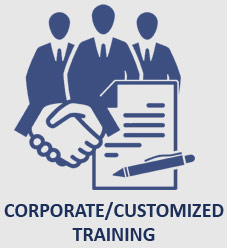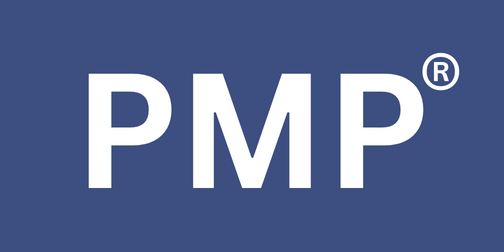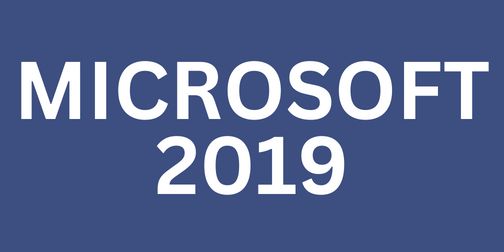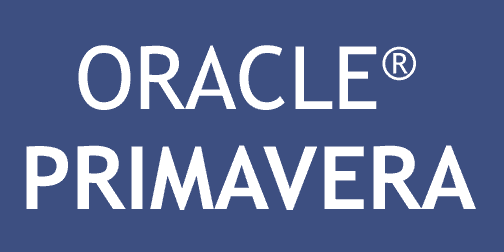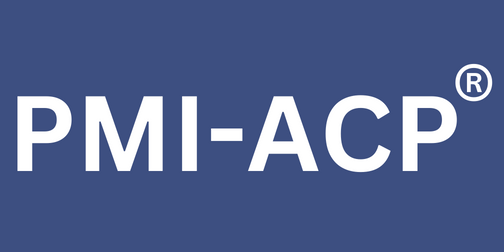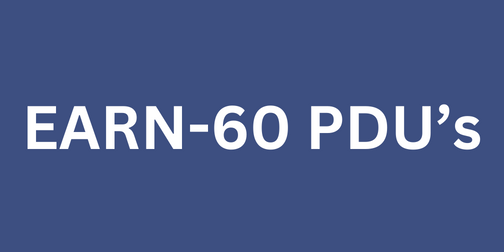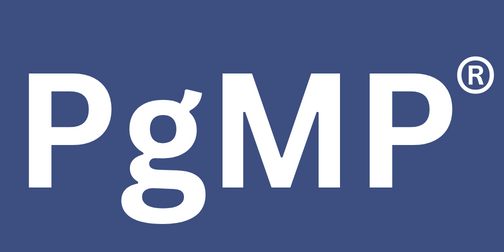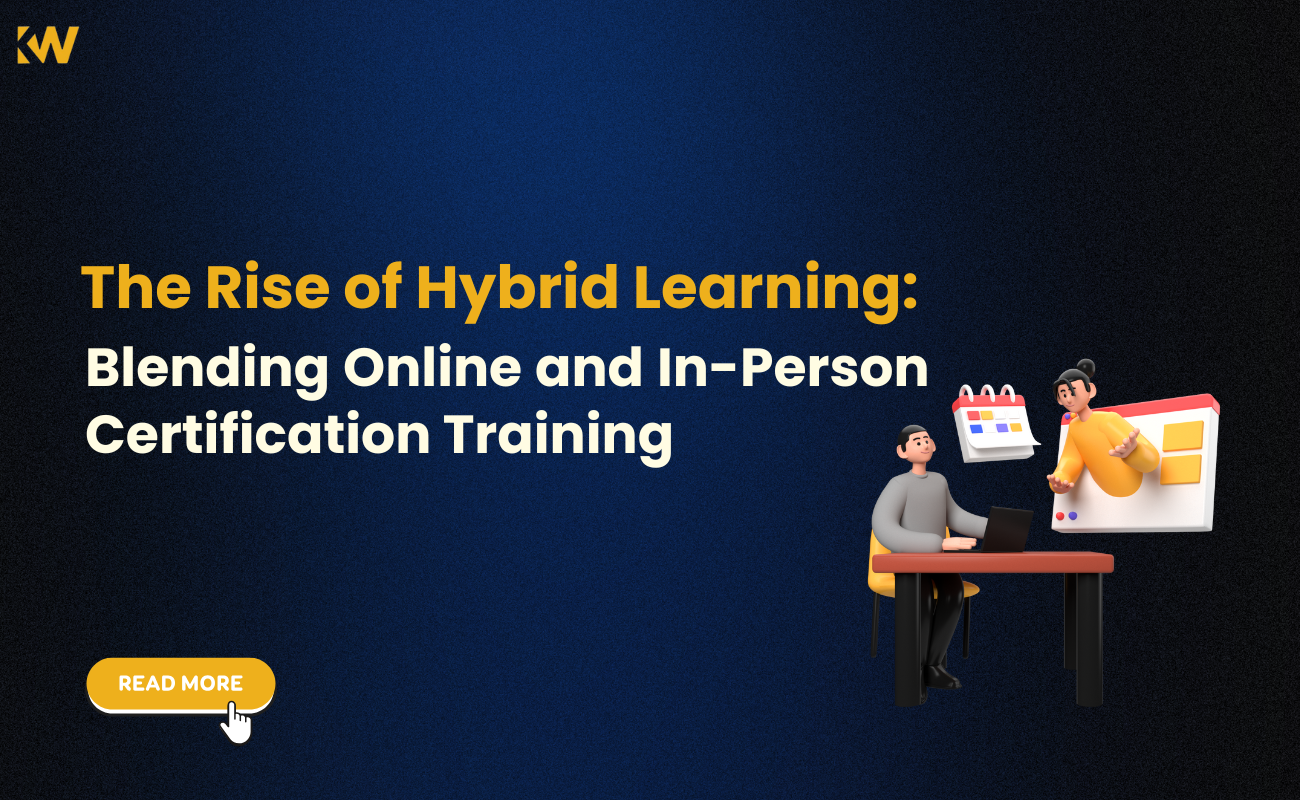
The Rise of Hybrid Learning: Blending Online and In-Person Certification Training
Posted On January 13, 2025 - 11:34 AM
In the current fast-paced, technologically driven world, the need for professional certifications is increasing as companies and individuals seek to improve their skills and remain in the game. In addition, a new educational model has been developed to connect traditional and contemporary learning methods: hybrid learning. Combining in-person and online learning is a dynamic, flexible method that has transformed the methods professionals are trained to pass certification exams.
Knowledgewoods, a pioneer in professional certification The blended learning approach has been an integral part of our programs, allowing students to maintain their professional and personal commitments without hindering the quality of education. The following blog post will look at the increasing popularity of hybrid learning and its transformative impact on the certification process.
What is Hybrid Learning?
Hybrid learning, often referred to by the name blended learning combines online learning platforms and tools with instructor-led instruction in person. Contrary to traditional online or in-person designs, hybrid education is the most beneficial of both and offers the ease of learning remotely and the interaction as well as the structure and organization of class interaction.
This type of model is especially suitable for certification training, as many people have hectic schedules at work and pursue professional development. When you're working towards the PMP, Salesforce or an Agile-related certification the hybrid model offers greater flexibility and individualization.
The Growing Popularity of Hybrid Learning in Certification Training
-
Accelerated Adoption Post-Pandemic
The pandemic spread across the globe and shifted educational systems across the globe towards remote learning. As the restrictions were eased, students as well as trainers realized the advantages of combining online and offline methods. Learning through hybrid models came into existence as a natural evolution, giving flexibility and continuity.
-
Advancements in Technology
Starting from Learning Management Systems (LMS) to AI-driven tools the advancement in technology makes it much easier to develop and offer hybrid courses for certification. Video lectures, simulations in virtual reality interactive quizzes and real-time feedback have improved learners' experience.
-
Demand for Flexibility
Professionals today require a method that can be adapted to their needs. Hybrid learning is flexible without sacrificing accountability, which makes it ideal for people trying to manage work, family life and career growth.
-
Employer Support
Many businesses now offer employee certifications and prefer hybrid models that minimize disruptions to work hours and ensure that employees are trained in person.
Key Benefits of Hybrid Learning for Certification Training
1. Flexibility and Convenience
Hybrid learning enables learners to access their study materials at any time and from anywhere, which allows them to manage their learning by their own needs. For example, a project manager who is studying for an exam for a PMP certification can access online tutorial videos during their commutes and attend live workshops to master important concepts.
2. Enhanced Engagement
While online learning can be flexible, however, it can seem lonely. Hybrid models allow learners to stay active through interactions in person and live Q&A sessions as well as group-based activities. This type of interaction fosters the spirit of collaboration and helps to build an atmosphere of belonging.
3. Cost-Effectiveness
Students save on the costs of travel and accommodation that are associated with in-person courses. Additionally, online training modules are reusable across groups, which reduces the cost of training for institutions.
4. Personalized Learning Experiences
With sophisticated analytics, the online elements of hybrid courses can monitor the progress of learners and tailor content to suit individual needs. Additionally, in-person training sessions offer the opportunity to get immediate mentoring in addition to clarification questions.
5. Skill Reinforcement Through Practical Application
In-person sessions of hybrid learning tend to be interactive, giving students the chance to test their knowledge on the Internet. For example, Salesforce certification training might contain online courses covering CRM concepts as well as in-person training sessions that focus on tackling real-world scenarios.
6. Higher Retention Rates
Research has shown that blended learning methods result in better retention of knowledge when compared to traditional single-mode formats. Combining audio, visual interactivity and visual elements cater for different ways of learning, thereby strengthening the most important concepts.
How Hybrid Learning is Shaping Professional Certifications
1. Customizable Learning Paths
Hybrid learning platforms, such as the ones offered by knowledgewoods permit students to pick their preferred method of participation depending on the topic or availability. For instance, the foundational courses may be self-paced online while more advanced subjects require live classes or boot camps in person.
2. Integration of Real-World Scenarios
Certification training typically requires applying theoretical principles to actual problems. Hybrid learning allows for to seamless integration of real-life situations with virtual labs, case studies as well and collaborative projects.
3. Global Reach but with Local Impact
Institutions can engage with students around the world by offering online modules, as well as individual in-person sessions that are tailored to the needs of the instruction. This method is especially beneficial for certifications that have a global reach, such as GCP as well as PMP.
4. AI and Analytics in Learning
AI-driven tools offer insights into how learners behave, revealing areas for improvement. The insights gained can then be used to design the in-person training sessions, making sure that the time spent in class is focused on the most important aspects of the syllabus for certification.
Challenges of Hybrid Learning and How to Overcome Them
Although it has many benefits it comes with its set challenges:
-
Technical barriers: Most learners are not connected to the internet at a high speed or modern technology.
-
Solution Institutions can provide offline access to the study materials and create platforms that are optimized for limited bandwidth.
-
Balancing In-Person and Online Components: Finding the ideal combination of face-to-face and online sessions can be a challenge.
-
Solution Feedback from learners can aid in defining the structure and the timing of hybrid programs.
-
Engaging and Keeping Learning: Students could lose their concentration during online sessions if they feel disengaged.
-
Solution Use interactive elements such as polls questions, and discussion boards to keep users engaged.
-
Consistency in delivery: Differential the quality of teaching between in-person and online modes can affect the learning outcomes.
-
Solution Standardized content and well-trained instructors guarantee uniformity in the delivery.
Hybrid Learning at knowledgewoods: Our Approach
At Knowledgewoods, we're dedicated to helping students achieve their goals for certification through efficient and innovative training methods. Our hybrid training programs are designed to:
-
Allows for flexibility: You can choose between in-person self-paced online courses, live virtual classes, or workshops.
-
Guarantee Quality: Access top-quality updated study materials and instruction from instructors who are certified.
-
Encourage Practical Learning: Engage in small-group discussions and practice tests to prepare you for real-world challenges.
Our most well-known hybrid programs are:
-
PMP Certification Training
-
Salesforce Certification Courses
-
Google Cloud Professional Training
-
Agile and Scrum Certification Programs
With the use of cutting-edge methods and tools to ensure that students get a full, exciting and engaging learning experience.
The Future of Hybrid Learning in Certification Training
As technology continues to improve and technology improves, this hybrid model of learning will get more advanced. The most important trends to be aware of include:
-
Virtual Reality (VR) and Augmented Reality (AR): Experiences that are immersive for learning.
-
Gamification Gamification: Interactive elements such as badges, leaderboards and rewards to boost motivation.
-
AI-powered Mentorship: Personalized coaching via AI-powered virtual mentors.
For knowledgewoods and other institutions, the concept of hybrid learning isn't simply a trend but rather an approach that will provide students with the tools and support they require to succeed in their certification paths.
Conclusion
The advent of hybrid learning has marked the beginning of a new age in professional certification that combines the advantages of in-person and online learning to create a flexible productive, and results-oriented method. With this approach, Knowledgewoods is helping professionals upskill to grow and advance in their careers.
In the future, we can expect that hybrid education will only grow and offer more opportunities for students around the world. If you're looking to earn a PMP, Salesforce, or any other certification The hybrid model will ensure you'll have the tools to be flexible, adaptable, and supported to meet your objectives.
Are you ready to begin your journey to certification using knowledgewoods? Explore our hybrid learning programs now and discover the most effective combination of the two worlds!
Check Out This Blog : Increasing ROI from PMP Certification - Insights and Strategies for 2025











